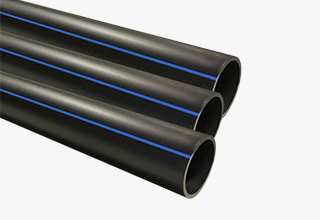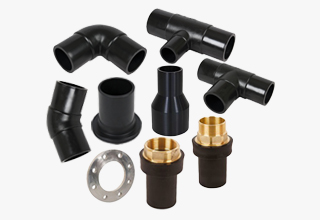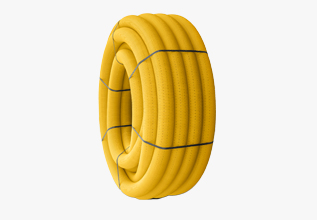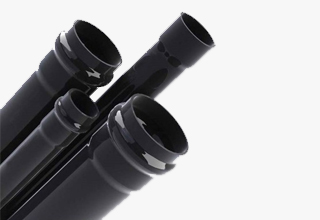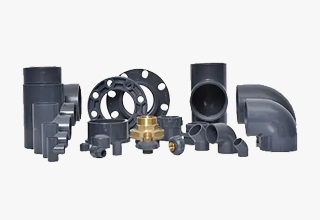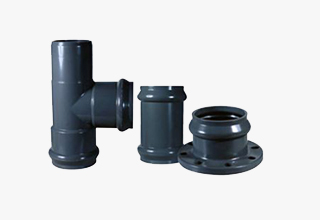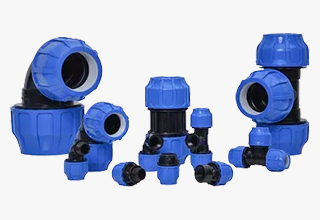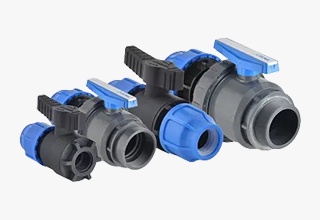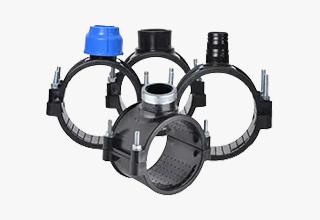Infrastructure Products
Infrastructure Pipe Systems
Under the heading of Infrastructure Pipe Systems, we will explore essential information about these networks—an indispensable component of modern urban life. Such systems play a vital role in meeting fundamental needs, including water supply, wastewater management, stormwater collection, and drainage. The types of pipes and materials employed are critical to the efficiency, durability, and environmental suitability of these systems.
Materials Used in Infrastructure Pipe Systems
The materials selected for infrastructure pipe systems are critical to their durability, efficiency, and service life. Different needs and applications call for different materials. Below are some of the key materials commonly used in infrastructure pipe networks:
PVC (Polyvinyl Chloride): Lightweight, economical, and highly chemical-resistant, PVC pipes are often chosen for water supply, drainage, and sewer lines. They are known for easy installation and long service life.
PE (Polyethylene): Flexible and durable, PE pipes are used for water conveyance, gas distribution, and sewer systems. They stand out for their high impact strength and corrosion resistance.
PP (Polypropylene): Polypropylene pipes are typically used in wastewater and chemical transport systems. They are valued for their chemical resistance and heat tolerance.
Concrete: Favored for large-diameter sewer and storm-water drainage systems, concrete pipes offer high strength and long life. They resist abrasive substances and high pressure.
Cast Iron: Renowned for durability and high pressure resistance, cast-iron pipes are commonly employed in sewer networks. Protective coatings are applied to ensure long-term corrosion resistance.
These materials are selected according to the requirements of each infrastructure project, each offering specific advantages that provide effective solutions for water management and wastewater disposal. Choosing quality materials enhances the performance and reliability of infrastructure systems.
Among the materials used in modern infrastructure pipe systems are HDPE pipes, PE fittings, drainage pipes, corrugated pipes, U-PVC pipes, PE100 pressure water pipes, and coupling valves—all contributing to efficient, long-lasting installations.
HDPE Pipe
HDPE (High-Density Polyethylene) pipes are among the primary materials preferred in infrastructure systems. Their standout feature is their high resistance to chemicals combined with a flexible structure. HDPE pipes are ideal for a variety of applications, such as underground water management and wastewater systems. In addition, they resist UV radiation and provide excellent impact strength even at low temperatures. Known for their long service life, they are also a cost-effective choice.
PE Fittings
PE fittings are indispensable components of HDPE pipe systems. They ensure leak-free joints and outstanding connection reliability even under high pressure. Easy and quick to install, PE fittings withstand harsh environmental conditions. These couplings are widely used in water-conveyance systems, irrigation projects, and industrial applications, boosting cost efficiency through high flexibility and long service life.
Drainage Pipe
Drainage pipes are designed to control water accumulation that forms after heavy rainfall. By effectively removing water underground, they help protect building foundations from water damage. Produced from environmentally friendly materials, these highly permeable pipes work in harmony with the soil. Drainage pipes play a critical role in rapidly evacuating excess water from gardens and agricultural areas.
Corrugated Pipe
Corrugated pipes are another pipe type favored in particularly challenging terrain conditions. Thanks to their double-wall construction, they provide superior protection against mechanical damage. Their flexible structure allows perfect adaptation to ground movement, thereby minimizing leakage risk. Made of high-density polyethylene (HDPE), corrugated pipes are widely used in large-diameter drainage and sewer systems. Their durability and longevity make them a cost-effective solution.
U-PVC Pipe
U-PVC (Unplasticized Polyvinyl Chloride) pipes are widely used in water supply and drainage systems. Their key attributes are light weight and high corrosion resistance. They perform efficiently across a broad temperature range, making them suitable for hot- and cold-water applications. U-PVC pipes are also resistant to chemicals and environmental effects, which makes them ideal for industrial wastewater systems. With easy installation and low maintenance requirements, they offer a cost-effective solution.
PE100 Pressure Water Pipes
PE100 pressure water pipes are a cornerstone of modern water-management systems. Manufactured from high-density polyethylene (HDPE), these pipes are perfect for high-pressure applications. Their flexible structure allows them to maintain integrity even during seismic activity and ground movement. Offering exceptional leak-tightness and chemical resistance, PE100 pipes provide reliability in water-conveyance systems and are ideal for potable-water networks, irrigation, and industrial uses.
Coupling Valves
Coupling valves are designed to control flow within pipe systems. They offer users time and cost advantages thanks to easy assembly and disassembly. Their long-lasting construction requires minimal maintenance, making them ideal for frequently used systems. Coupling valves are preferred in various industrial facilities to enhance efficiency in fluid management.
Advantages of Infrastructure Products
Infrastructure products play a critical role in the smooth operation of modern cities and industrial areas, delivering durability, efficiency, and long service life. Key advantages include:
Durability and Reliability – Manufactured from materials capable of withstanding harsh environmental conditions, they provide long-lasting, reliable performance. Pipes made from HDPE or PVC, for example, resist high pressure and chemical exposure.
Easy Installation and Maintenance – Modern infrastructure products allow fast, straightforward installation. Their light weight and flexible designs shorten assembly times and reduce labor costs. They also typically require low maintenance, lowering operating expenses.
Environmental and Economic Benefits – Effective drainage systems prevent flooding and pollution while supporting efficient water management. Their long service life delivers long-term cost savings.
Flexibility and Adaptability – A broad product range allows tailored solutions for specific project requirements. Flexible pipes and connections offer high adaptability even in complex layouts.
Advanced Technology and Performance – Cutting-edge technologies, such as electrofusion joints, guarantee leak-proof, secure connections, reducing water losses and maintenance needs.
These benefits make infrastructure products indispensable for both public and private-sector projects, supporting urban development and industrial efficiency.



 BİZE YAZIN
BİZE YAZIN
